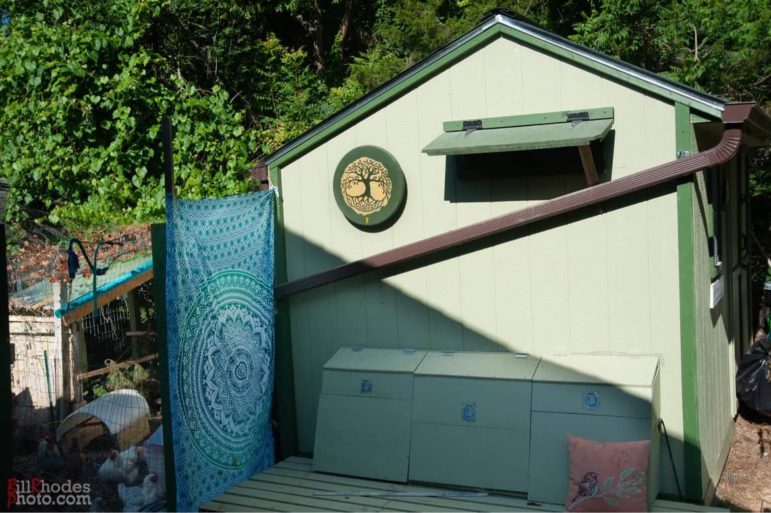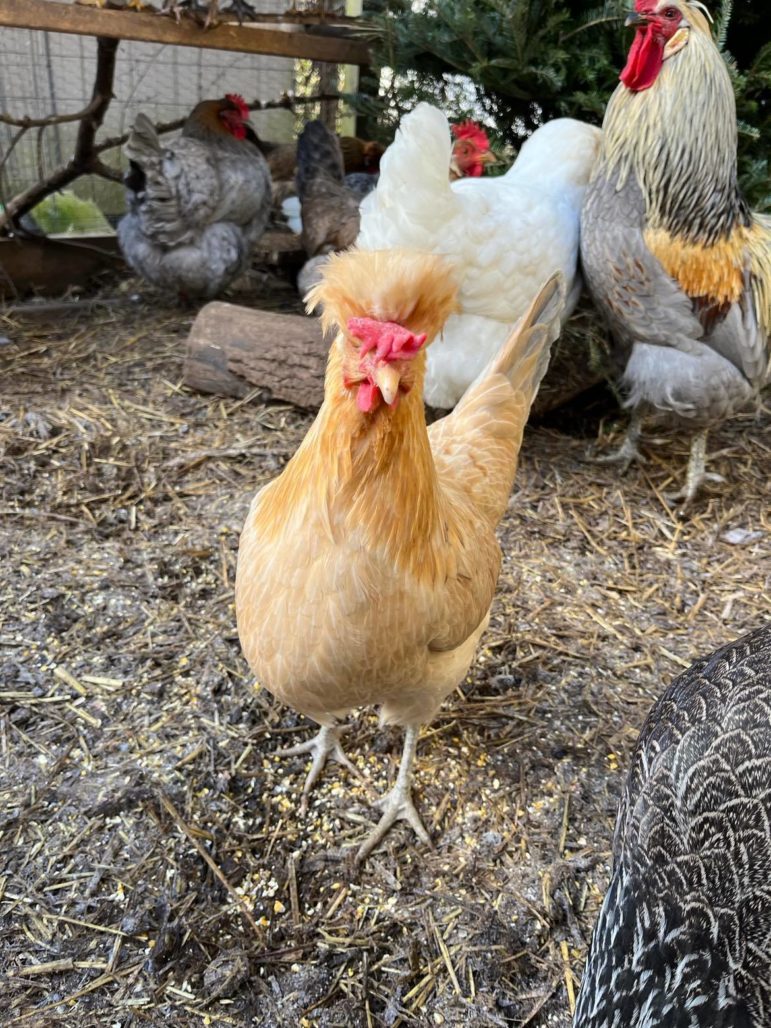
I woke today to the sounds of soft rain and a peaceful household, having somehow slept through the dog’s morning shenanigans and my husband getting them both ready to go out for the day. Neither of them is quiet by nature, so I deeply appreciate the effort made to not disturb my rest. Yesterday was a demanding day, and by the time I was able to sleep, I was exhausted. Life on a Pagan homestead is not all about meditation and communing with spirits. Sometimes there is heavy work to be done.
Two nights ago, I went out to put the chickens up and found three wood rats inside the chicken coop. They were larger than my closed fist, had cute, round, wiggly noses, and were frightened by my appearance (eek! a Witch!). They were also a threat to the well-being of the 21 chickens who live under my care and protection at Bear Path Cottage.

The barn at Bear Path Cottage [S. Barker]
I have been aware of the rats’ night-time presence in the chicken run and barn since late autumn. One evening I saw a rat in the run after the chickens were in the coop. Sigh. There is never only one rat. A few days later, I found rat droppings in the barn. I was not happy about that, but rodents cannot get into the galvanized steel treadle feeders in the run, nor the galvanized steel storage bins in the barn that hold feed, scratch, sunflower seeds, and mealworms. Confident that the coop itself was secure from the intruders, I hoped the lack of food in the barn would discourage them, and they would stop going inside.
Contrary to common belief, rodents are not drawn to chicken coops because of the birds; they come because they are attracted by the smell of food. Chickens are messy eaters. They drop crumbles on the ground around the feeders and miss pieces of the scratch and other treats provided as part of their diet and daily enrichment. Without spending considerably more time, energy, and resources than I have available at this time, it is impossible to police the food scraps in the current setup of my outdoor chicken run. Because of that, there will be food on the ground that attracts rodents, making them an inevitable part of the ecosystem.
As long as they follow the established laws of hospitality, most beings are welcome to pass through, seek shelter, rest, or live within the boundaries of the Cottage proper. The night I saw the first rat, I reminded him and his kin of those rules. Then I mucked the coop and deep-cleaned the barn to make sure there was nothing that would draw the rats in. When the physical labor was done, I gathered some offerings and paid a visit to Brigid’s altar. Situated in such a way that it overlooks the barn, it was the perfect place to talk with her and the land spirits about the rats, hospitality, and the consequences to all of us if further action had to be taken.
I knew how they were getting into the barn, of course. As with the majority of human/animal conflicts, the problem lies on the human side of the equation. In this instance, fixing that problem is on the to-do list, awaiting the perfect alignment of health, time, wisdom, and lumber prices. In the meanwhile, it falls upon me to do the work to keep them out of the barn.
Si vis pacem, para bellum. “If you want peace, prepare for war.” This was the parting advice from Brigid as I strolled back to the house that night. Before I went inside I stood next to the run gate and repeated those words into the darkness, knowing the rats could hear me.
There was no further sign of the rats in the barn until a deep freeze hit this area in late December.

Chickens at Bear Path Cottage [S. Barker]
Although the Cottage chickens are all cold-hardy stock, the temperatures were so extreme for this area that the birds would not leave the coop and would not have been safe had they done so. I had no choice but to provide water and food to them in the coop, which goes against the rules of good coop management. Those actions also temporarily removed a food source the rats had come to rely on, and it was no surprise to see evidence of them in the barn. They came in seeking food, but there was none to be had. I know they have their own warm and cozy den somewhere, but I could not fault them for seeking food and shelter. Those few days were brutally cold.
I am not a rookie anymore, but I certainly made a rookie mistake, reinforced by rainy weather, illness, depression, and fatigue. I delayed hard-mucking the coop, which means I delayed cleaning it from top to bottom, removing any trace of food leftover from the days of feeding the chickens indoors. I also delayed tidying the mess on the barn side that resulted from dealing with the deep freeze.
It took only a little more than two weeks for the very determined rats to chew three almost hidden entrances from the barn side into the coop. Even though there was food in the run every night, they wanted the food they could smell in the coop. As soon as that breach was made, they found and ate an egg. I found the remains of that shell the night I found them in the coop.
When I talk about the barn, people sometimes think I mean one of those massive red structures one sees dotting the rolling landscape of America’s farmlands. I do not. Two years ago when I decided to increase the size of my small flock, I upgraded the stand-alone chicken coop to the barn I have dreamed of owning since I was a child walking past the storage buildings for sale in the Agway parking lot. Back then, I wanted one for a playhouse. Perhaps that is what I have now. It is a small building (12’x10’) with the interior divided into the coop (6’x10’) and the barn side (6’x10’). These two spaces are connected by a door, there is a door directly from the barn side into the chicken run, and there is an automatic chicken door from the coop side into the run.
So, the rats were not exactly crossing mountain ranges to fight their way into the coop. Theoretically, they could probably jump from the edge of my workbench to the hardware cloth ventilation window in the wall between the two spaces. I believe the smaller space leaves less room for error and potentially magnifies any resulting harm.
I had reminded the rats of the laws of hospitality, and their presence in the coop a few weeks after that was a breach of multiple boundaries. From the practical tiny homestead perspective, it meant both that the chickens were in danger and there was more physical work to be done. From the perspective of being a person responsible for the well-being of livestock, it forced both practical and emotional conversations about the possibility of having to take lives. And from the perspective of having a spiritual relationship with the land, it meant there was yet again more magical work to be done once everything else had been tidied up. This is what I meant by heavy.
What was the big deal? They were just rats, right? Why not put out poison, bait traps, sticky traps, or any of the other impersonal, violent, and cruel means of dealing with rodents who invade space in which they are not welcome? The simple answer is because that ain’t how we do. The deeper and more honest answer is more complicated than that.
When I purchased this home and land, I did more than take title to some property. I made a covenant with the land and the land spirits to care for them and all the lives they hold. To work to nourish them and help them provide for the animals and the winged and crawly creatures who, in turn, sustain the land. I made myself a part of this ecosystem, and every decision I make, every tree, bush, and flower I plant, every wall or fence or bridge I build, every chore I do or do not do impacts all of us. Every single one of us. Humans, bears, foxes, chickens, snakes, rats, blue-tailed skinks, butterflies, etc., ad infinitum. All life is sacred here. Death is sacred, too.
Invoking the laws of hospitality is part of that covenant and perhaps even deepens its meaning and intentionality because accepting those laws goes both ways. Both host and guest are bound by that agreement. I will no sooner kill a rat for using access I left available than I would kill a bear for dining from an unsecured trash can.

Marg the Icelandic Viking Chicken [S. Barker]
I have been enjoying re-reading the literary treasures of my childhood; as memory brings them around, I sometimes order a used copy from an online bookstore. On the day I found the rats in the coop, Robert C. O’Brien’s Mrs. Frisby and the Rats of NIMH arrived in the mail. It was waiting for me on the kitchen counter when I went inside.
If credit (or blame) for my tender heart and open spirit must be attributed, then I will lay it gently at the feet of the likes of Mr. O’Brien, Richard Scarry, Beatrix Potter, Rudyard Kipling, E. B. White, C.S. Lewis, and A. A. Milne. Certainly, these are only a handful of the dozens of authors whose use of anthropomorphism reinforced my early and intuitive beliefs about the feelings, lives, and spirits of animals long before I knew anything about animism, Paganism, or Witchcraft.
Two nights ago, I found rats where rats do not belong. I spent yesterday working to correct that situation. I hard-mucked the coop and deep-cleaned the barn, and my husband used sheet metal and wood scraps to seal the illicit entrances. In between working, I played ball with the dog while the kitten watched from her perch in the window. I can never tell if she wants to join in or pounce on his head. The south yard where we played is a rich viewing ground for wild bird life. In that space, the songs and calls of Carolina wrens, northern cardinals, black-capped chickadees, sparrows, and mourning doves carry lines and notes through the air that help weave the magical tapestry of life on these grounds.
Once the chores were completed, I sat along for a long time, thinking about what it would mean to have to kill the rats. If I can keep them out of the coop, I can tolerate occasional incursions into the barn if the chickens are not harmed. If I cannot keep them out of the coop, then I will kill them.
The to-do list has been updated. The situation that allows entrance into the barn will be fixed as soon as possible. In the spring, I will restructure the feeding area in the coop to minimize the presence of food waste. The chickens will be distressed by the work for a day or so, then gather around to admire their new dining patio. The dog and the kitten will continue to play. The birds will continue to fly and nest and sing. I will continue to work with the land and land spirits and hope that the tapestry of this magical space will remain unmarred by death.
The Wild Hunt is not responsible for links to external content.
To join a conversation on this post:
Visit our The Wild Hunt subreddit! Point your favorite browser to https://www.reddit.com/r/The_Wild_Hunt_News/, then click “JOIN”. Make sure to click the bell, too, to be notified of new articles posted to our subreddit.